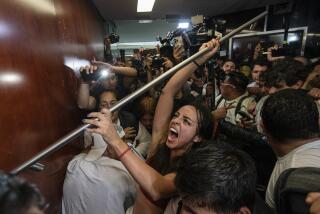Panamanians Keep Ban on Reelection
- Share via
LIDICE, Panama — Voters on Sunday overwhelmingly rejected an attempt to allow Panama’s presidents to seek reelection, in what observers said was a stinging defeat for the incumbent, Ernesto Perez Balladares.
With 82% of the ballots counted, 62.5% were against lifting the constitutional prohibition on consecutive terms for presidents. The vote was seen as a rejection of the free-market reforms of Perez Balladares and his ruling Democratic Revolutionary Party, or PRD.
“I am satisfied to hear the voice of the people, and we have heard it clearly,” the president said in a nationally televised concession speech. “This has been a consolidation of democracy.”
In that respect, at least, his opponents agreed.
“This is a triumph for the Panamanian people,” said Mireya Moscoso, the presidential candidate of the leading opposition party. “Thank you for defending democracy in this country.”
Throughout the night Sunday, victorious opponents drove through the streets of the capital, Panama City, waving banners to celebrate.
Perez Balladares had sought to become the first Panamanian president allowed to seek a consecutive term since 1928. Had he subsequently won reelection, he would still have been president when the United States turns over the Panama Canal to Panama on Dec. 31, 1999.
Opponents of the proposed constitutional change had warned that reelection could undermine the progress that Panama has made toward democracy in the almost nine years since dictator Gen. Manuel A. Noriega of the PRD was overthrown by a U.S. invasion.
Voters said they were casting ballots based on their experience with the current administration.
Ruben Dario Samaniego, 38, and his wife, Xiomara Cedino, 33, voted against permitting reelection because they believe that the government has ignored their problems.
Samaniego is a fisherman--during the six-month fishing season. But when the season is over, he is out of work. He does not make enough money fishing for sardines for animal feed to both support his six children, ages 3 to 14, and save money for when fishing stops.
In contrast, voters such as Carmen Peralta decided that they wanted to give Perez Balladares a chance to extend his term. Peralta, a chemist who lives in this town about 50 miles outside Panama City, is grateful to the president for cutting her daily commute in half.
Under Perez Balladares, the Pan American Highway has been widened to four lanes from two. “Remember the traffic jams?” pro-reelection billboards along the highway have been asking.
*
Voter turnout overall was surprisingly high--63.3%--despite an early morning downpour. The five voting precincts at the school here were busy--two even had lines.
In neighboring towns, turnout was far lighter: At nearby Quebrada Grande, one determined voter waded through ankle-deep water to get to the polling place at the local school. In Lidice, both proponents of reelection and opponents brought voters to the balloting center in minivans.
Volunteer coordinators in “Yes” and “No” T-shirts assisted voters in finding the areas within the building where they were required to cast their ballots according to precinct. Many appeared confused by election officials whose identifying T-shirts had a replica of a ballot--marked “Yes.”
But the legendary organization of the PRD ultimately was not enough to offset citizen anger with the Perez Balladares administration, which has sold off government companies and slashed import tariffs--moves that have cost jobs. While jobs overall have grown slightly since the president took office, the growth has not been enough to make a dent in this nation’s severe unemployment.
In his concession speech, Perez Balladares noted ironically that the loss at least served to “derail . . . suspicions about [the honesty of] the electoral process.”
“We have a year of government left,” he said. “In that year, we will put all of our effort into successfully completing as many as possible of the programs that we still have pending.”
Then, he added, “On Sept. 1, 1999, I will turn over the country to whomever the people designate.”
More to Read
Sign up for Essential California
The most important California stories and recommendations in your inbox every morning.
You may occasionally receive promotional content from the Los Angeles Times.













